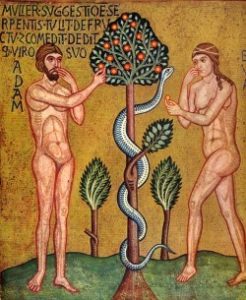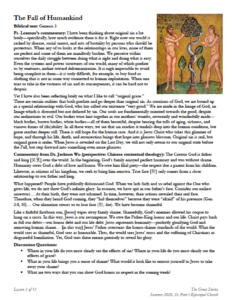
Biblical text: Genesis 3
Fr. Lorenzo’s commentary: I have been thinking about original sin a lot lately—specifically, how much evidence there is for it. Right now our world is racked by disease, social unrest, and acts of brutality by persons who should be protectors. When any of us looks at the relationships in our lives, none of them are perfect and some of them are manifestly broken. We perceive within ourselves the daily struggle between doing what is right and doing what is easy. Even the systems and power structures of our world, many of which predate us by centuries, incline toward dehumanization. It is nigh impossible to avoid being complicit in them—it is truly difficult, for example, to buy food or clothing that is not in some way connected to human exploitation. When one tries to take in the vastness of sin and its consequences, it can be hard not to despair.
Yet I have also been reflecting lately on what I like to call “original grace.” There are certain realities that both predate and go deeper than original sin. As creations of God, we are bound up in a special relationship with God, who has called our existence “very good.” We are made in the Image of God, an Image which is distorted but not defaced by sin. Our souls are fundamentally oriented towards the good, despite our inclinations to evil. Our bodies were knit together in our mothers’ wombs, reverently and wonderfully made—black bodies, brown bodies, white bodies—all of them beautiful, despite bearing the tolls of aging, sickness, and various forms of (dis)ability. In all these ways, we see that sin reaches it tendrils deep into the human condition, but grace reaches deeper still. There is still hope for the human race. And it is Jesus Christ who takes this glimmer of hope, and through his life, death, and resurrection brings that hope into glorious blossom. Original sin is real, but original grace is realer. When Jesus is revealed on the Last Day, we will not only return to our original state before the Fall, but step forward into something even more glorious.
Commentary from Dr. Jackson Wu (perspective: Chinese contextual theology): The Creator God is father and king [父王] over the world. In the beginning, God’s family enjoyed perfect harmony and was without shame. Humanity owes God a debt of love and honor. We owe him filial piety––the respect due a parent from his children. Likewise, as citizens of his kingdom, we seek to bring him renown. True face [脸] only comes from a close relationship to our father and king.
What happened? People have publically dishonored God. When we lack faith and so rebel against the One who gives life, we do not show God’s infinite glory. In essence, we have spit in our father’s face. Consider our earliest ancestors… At their birth, they were not ashamed. In time, however, their actions revealed their real face. Therefore, when they heard God coming, they “hid themselves” because they were “afraid” of his presence (Gen 3:8, 10)… Our alienation causes us to lose face (脸, lian). We have become shameful.
Like a faithful firstborn son, [Jesus] wipes away family shame. Shamefully, God’s enemies allowed his corpse to hang on a cross. In this way, Jesus is our recompense. We owe the Father-King honor and our life. Christ pays back in full our debts––our honor debt and our life debt. Jesus represents humanity––perfectly glorifying God and removing human shame… [in this way] Jesus’ Father overturns the honor-shame standards of the world. What the world sees as shameful, God sees as honorable. Thus, the world sees Jesus’ cross and the suffering of Christians as disgraceful humiliation. Yet, God uses these means precisely to reveal his glory.
Discussion Questions:
• Where in your life do you most clearly see the effects of sin? Where in your life do you most clearly see the effects of grace?
• What in your life brings you a sense of shame? What would it look like to entrust yourself to Jesus to take away your shame?
• What are two ways that you can show God honor or respect in the coming week?



Comments are closed.